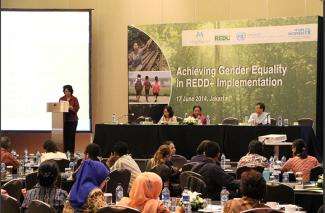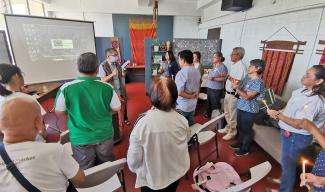Gender mainstreaming is not a goal in itself, but a process that can facilitate the ultimate objective of gender equality. This is a goal to which Indonesia is committed through its Constitution and as a signatory to international agreements such as the Universal Declaration of Human Rights and the Convention to Eliminate All Forms of Discrimination against Women. Further, gender equality is a key normative component of Indonesia's claims to represent a democracy pursuing a development path guided by the theme of sustainable growth with equity'.
Thus summary from the UNORCID Dialogue Series: Achieving Gender Equality in REDD+ Implementation, 17 June 2014, at Double Tree by Hilton Hotel, Jakarta.
REDD+, like gender equality, is also envisaged to be a key component of Indonesia's pathway towards sustainable development. The socio-economic impacts of REDD+ depend critically upon how it is designed. Research from forestry projects around the world have demonstrated that REDD+ programmes can worsen gendered inequalities in terms of the division of labour, participation in decision-making, access to resources, and access to financial renumeration from sustainable forest management. Yet, if gender is taken into account in the design and implementation of REDD+ programmes, they could potentially act as an innovative entry point for facilitating women's empowerment and gender equality in the sphere of forest governance.
A range of perspectives from the Indonesian government, key foreign government partners, international organisations, civil society and academia were brought together at this event in order to encourage knowledge-sharing, build collaboration, and reinforce commitment to a socially-inclusive and empowering form of REDD+. The event does not claim to be the beginning nor the end of a conversation, but rather about orienting the framework of an already-ongoing conversation towards large-scale societal transformation.
Key messages that arose were as follows:
Sustainable natural resource management and social equity are interlinked and mutually dependent. This message is implicit in REDD+ as Beyond Carbon', but its practical implications are as yet not fully drawn out. Doing so is critical to building support for a socially inclusive and empowering form of REDD+.
Gender equality is not only about women. The impacts of a gender unequal REDD+ strategy are detrimental to the resilience and wellbeing of families, communities and Indonesian society as a whole. Efforts to raise awareness of the importance of gender equality must include men as well as women, and seek out collaborative solutions.
Women' are not a homogenous group. Gender is only one component of a person's identity, and other factors such as socio-economic status, ethnicity and religion may be equally if not more influential upon a person's ability to exercise their agency and realise their rights. Gender mainstreaming strategies, and REDD+, must take this complexity into account.
Gender mainstreaming requires clear, qualitative targets and indicators. These must be genuinely reflective of the experience of women in terms of their ability to exercise their agency and achieve their human rights. Targets must be sufficiently ambitious, yet also able to accommodate the diversity that is inherent to the category of 'women'.
Gender mainstreaming in REDD+ can be informed by past and ongoing experiences. It is possible to draw from a wide range of initiatives and projects, though they may not explicitly be associated with either gender equality or REDD+.
More complete




